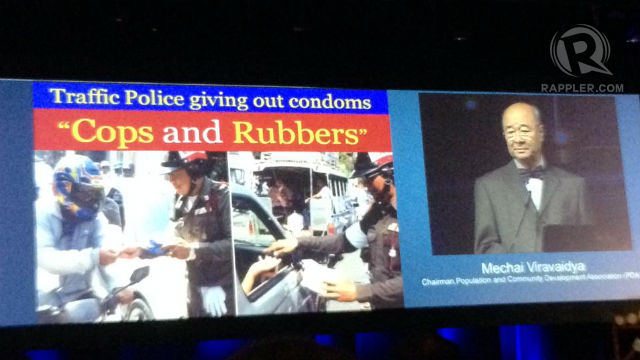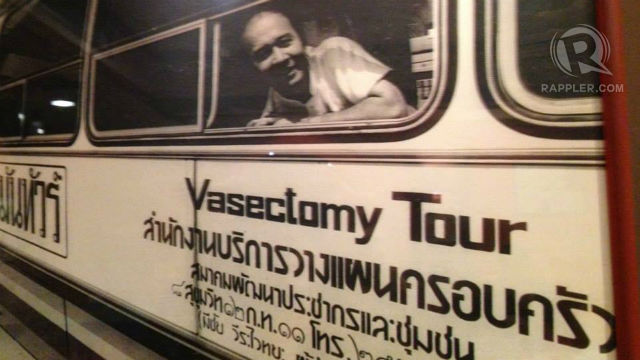SUMMARY
This is AI generated summarization, which may have errors. For context, always refer to the full article.

BANGKOK, Thailand – It was in the 90s when Thailand first realized that they were on the brink of an exploding HIV epidemic. It was projected that if the government did not take concrete action, there would be between 2-4 million people infected with HIV by the year 2000.
The country launched a 100% condom program that involved a massive public information and education campaign and widespread condom distribution. The United Nations (UN) said the program resulted in a 90% decline in new HIV infections over 12 years from 199. Meanwhile, the World Bank reported the campaign helped over 7.7 million people.
Thailand’s 100% Condom Program is regarded as one of the best practices in mainstreaming HIV/AIDS awareness and condom use. At the recently concluded International Conference on AIDS in Asia and the Pacific (ICAAP11), well-known HIV/AIDS and family planning advocate Mechai Viravaidya, took participants down memory lane.
and founder of the Population and Community Development Association He recounted the Thailand experience and how a mix of creativity, ubiquity injected with a bit of humor can go a long way in de-stigmatizing condoms, encouraging their use and driving down HIV infection.
1. Take NO as a question
“The government’s reaction to HIV [epidemic] in in Thailand was denial,” began Mechai. “More than that, the government prohibited media coverage of the issue.”
Instead of taking ‘no’ as an answer, Mechai and other activists took ‘no’ as a question and looked for alternative ways of getting the message of HIV awareness out. They turned to the army for help and persuaded them to use the army’s 300 radio stations and two television networks as a communication platform.
“We told them that a number of young men in the military were probably infected and there would be a lot more if we did not do something,” said Mechai.
2. Put an army together and train them

In 1991, then Thai Prime Minister Anand Panyarachun recognized HIV/AIDS as a major development challenge and mounted nationwide campaign, backing it up with government funding.
“There was a 50 fold increase in the government budget to fighting HIV and it all went into prevention and education,” according to Mechai, who was then serving as a member of parliament.
“We could not do this alone. We trained the government personnel and other influential groups like the Church; the media that were given special workshops on HIV reporting and training for teachers on sex education in public schools. We all had a role in getting this message out, but it had to be done correctly,” Mechai said.
Messages about HIV prevention began airing every hour on the country’s 488 radio stations and 6 television networks. Mobile sex education vans targeting the youth went around the different campuses and peer-training programs were launched to encourage young people to teach other young people about the importance of HIV prevention.
AIDS Day at schools was organized by students and AIDS assemblies, which were funded by business groups.
“Our message to the business sector was simple: dead customers cannot buy and sick employees cannot work,” Mechai said.
Primary school children were distributing HIV leaflets and condoms in villages. If the parents had a problem, we told them that we were saving lives.
When you say 100% condom program, mean it

To complement this mass education campaign was the actual distribution of condoms in the usual places of brothels and massage parlors, but it didn’t stop there.
“We distributed condoms everywhere: in banks, at gas stations, toll booths, in schools, even at weddings – most especially weddings. I think we only stopped short of distributing condoms at funerals.”
Even Bangkok traffic, which is sometimes at a standstill, was used as an opportunity.
“Bangkok traffic is a captive audience, it’s perfect for distributing condoms for our program ‘Cops and Rubbers’,” said Mechai.
Mechai even went so far as to put up a restaurant where you could have a meal and a condom on the side. In the famous Cabbages and Condoms, lamps, decorative mannequins and floral arrangements are all made using condoms.
“At Cabbages and Condoms, we want to help save your life, the other restaurants just want to make you fat,” Mechai quipped. (Read more about Thailand’s Condom Awareness Programs in the 90s here.)
Engage influential people and organizations

The Thai government also engaged in alliances with the World Health Organization (WHO), Global Fund, and UNAIDS as well as other NGOs advocating HIV/AIDS awareness and family planning.
During “Condom Nights with Mechai,” a Harvard MBA student dressed in a superman costume toured Bangkok’s infamous Pat-Pong red light district, distributed condoms, and encouraged sex workers to use condoms with their clients.
“It was probably the best thing he did with his Harvard MBA,” deadpanned Mechai.
“My name has now come to mean condom, and as a result, baby boys are no longer named Mechai,” he added.
For all his wit and humor, Mechai did not end his message on a high note. He warned of a resurgence of the HIV epidemic that will set back the advancements of these past campaigns. Pointing to the Thai government’s complacency which has led to declining budgets on HIV/AIDS prevention and education, Mechai lamented, “We have fallen asleep at the wheel.” – Rappler.com
Add a comment
How does this make you feel?
There are no comments yet. Add your comment to start the conversation.